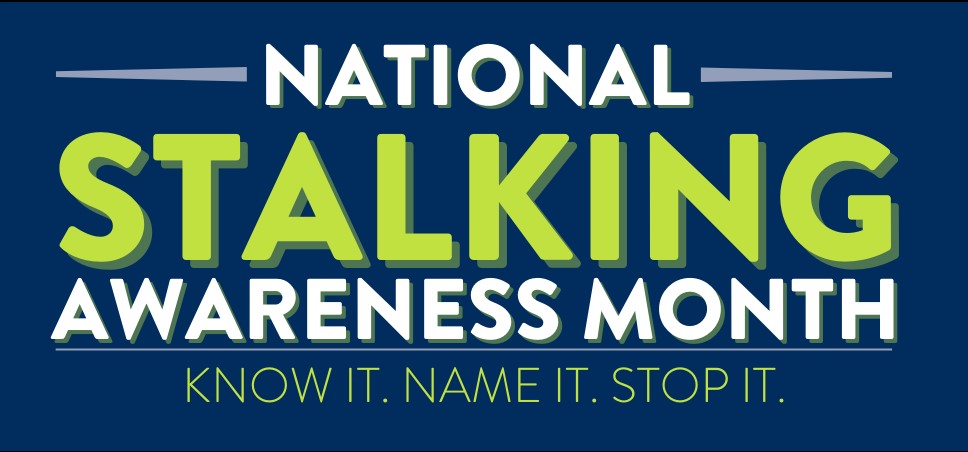Stalking Awareness Month (January)
- December 22, 2020
- Posted by: Lucca Wang
- Categories: 2020, All News & Blog Posts

January is Stalking Awareness Month. The first National Stalking Awareness Month (#NSAM2021) was recognized in January 2004 by the National Center for Victims of Crime.
The goal of Stalking Awareness Month is to increase awareness about stalking and the resources and the help available for victims of stalking.
Stalking is intentionally or recklessly engaging in a course of conduct targeted at a specific person which would cause that person in the circumstances to fear for their or their family member’s safety.
Any person of any age, economic status, sexual orientation, gender, gender identity, race, religion, or nationality can be stalked. Stalking is about power and control and is used by the stalker to intimidate their victim.
Examples of stalking might include: approaching the victim or showing up in places when the victim did not want them there; making unwanted phone calls; leaving the survivor unwanted messages (text or voice); watching or following the survivor from a distance; leaving unwanted gifts; destroying property; writing profanities, threats, or insults on the victim’s property or nearby; or spying on the survivor with a listening device, camera, or GPS (global positioning system).
1 in 6 women and 1 in 17 men in the US experienced stalking victimization at some point in their lifetime.
In Kansas in 2018, 898 stalking offenses were reported to law enforcement agencies. At least 1,601 Kansans reached out for victim services because of stalking, and 5,511 protection from stalking orders were requested.
54% of femicide victims in the US reported stalking to the police before they were killed by their stalkers. In 85% of completed and 75% of attempted femicides, there was at least one episode of stalking the year prior.
Survivors of stalking knew their perpetrator in 93% of all stalking offenses in Kansas in 2018. Current or former intimate partner suspects were responsible for 49% of all stalking offenses in Kansas in 2018. Stalking can happen before, during, and after a relationship.
Stalking can be a red flag, signaling that other types of abuse and violence have occurred, are occurring, or might occur:
- 46% of victims experienced one or more violent incidents by their stalker.
- 81% of women who were stalked by a current or former husband or cohabiting partner were also physically assaulted by that partner.
- 31% of women stalked by an intimate partner were also sexual assaulted.
Stalking victims and survivors are affected in the workplace, choose to move as a safety strategy, and become isolated from friends and family to keep those friends and family members safe and/or because of lack of support from those family members and friends. While victims and survivors experience many additional impacts in a variety of ways, these impacts can cause disruption of social connections, resources, and community and family support.
Victims of stalking need us to listen and support them.
Advocacy Services and Resources
To get help and access services, call the Kansas Crisis Hotline at 1-888-363-2287.
Find a map and listings of Kansas sexual and domestic violence victim advocacy programs at: https://www.kcsdv.org/find-help/in-kansas/dv-sa-services-map.
Learn more about stalking at https://www.kcsdv.org/learn-more/stalking/.
Newsletter (PDF) | On the KCSDV Website
This project was supported by Grant No. 2019-MU-AX-0021 awarded by the Office on Violence Against Women, U.S. Department of Justice. The opinions, findings, conclusions, and recommendations expressed in this publication are those of the author(s) and do not necessarily reflect the views of the Department of Justice, Office on Violence Against Women.
KANSAS CRISIS HOTLINE: 888-END-ABUSE | 888-363-2287
Last Updated on Dec 22, 2020